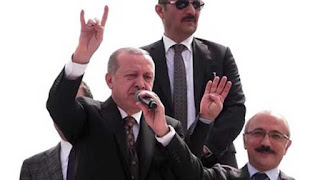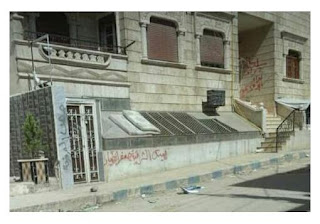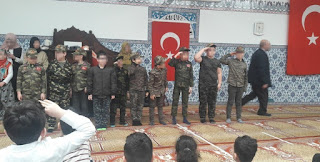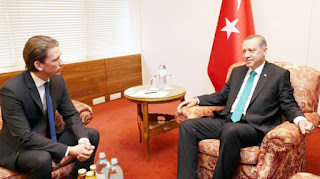| Turkey: Christian Vulnerability Escalates Yet Again
Posted: 20 Jun 2018 12:46 AM PDT The following post is essentially an extended version of:
Religious Liberty Prayer Bulletin (RLPB) 460, Turkey: Christian Vulnerability Escalates Yet Again, 20 June 2018———————-General Elections: Sunday 24 JuneOn Sunday 24 June, Turkish citizens at home and abroad will vote to elect both a president and a parliament. If none of the presidential candidates receives more than 50 percent of the vote, then the two leading contenders will face a second round of voting on 8 July. This will be the first general election since the April 2017 referendum in which Turks voted (51.3 percent in favour) to shift from a parliamentary to an executive presidential system [see RLPB 401 (5 April 2017)]. Originally slated for 3 November, rumour has it that the polls were brought forward precisely so voting would take place before the looming economic crisis kicks in. According to economist David Goldman, Turkey’s economic crisis has just begun, and ‘a 10%-20% overall economic contraction is quite possible. The political consequences of an economic disaster of that magnitude are hard to fathom.’
AKP-MHP alliance Concerning the parliamentary elections: Erdogan’s Justice and Development Party (AKP) has entered an alliance with the Islamo-fascist, far-right Nationalist Movement Party (MHP); together they expect to win a majority. Furthermore, Erdogan (now with MHP support) is confident he will win the presidential race in the first round. That said, a look at the opinion polls reveals a very tight race. Indeed, on 13 June, neither Erdogan nor the AKP-MHP coalition had a majority. Losing power is not an option Erdogan aspires to be a great Islamic leader, reminiscent of an Ottoman Sultan or a Caliph. For Erdogan and his supporters, losing power is unthinkable. It is already being mooted that if Erdogan wins the presidency but the AKP-MHP coalition fails to secure a majority in parliament, then he may simply demand fresh polls. One academic recently stated on air that if the AKP loses power, then Turks will ‘take to the streets in the name of Allah’, adding that he had a weapons cache buried in Istanbul’s Belgrad Forest, ready for such a time. Criticised for threatening civil war, the academic backed down, clarifying (supposedly) that the only thing he actually had buried in the forest was his ‘anger’ [over the July 2016 attempted coup — see RLPB 367 (20 July 2016)]. His back-flip however, has done nothing to ease people’s fears of unrest should the polls not consolidate Erdogan’s power. Erdogan in Afrin
For a glimpse of Erdogan’s ambition, one only needs to look at his actions in northern Syria. On 18 March, Afrin, in Aleppo Governorate, fell to Turkish forces. Since then, Turkish troops and their Free Syrian Army allies have ethnically cleansed Afrin of over 200,000 Sunni Muslim Kurds, some 35,000 Yezidi Kurds and some 3,000 Christians (Kurds, Assyrians and Armenians). Hundreds of civilians were killed in what has been described as some of the worst fighting of the war [see RLPB 447 (20 March)]. Afrin has since been repopulated with Arab Syrians, including tens of thousands of jihadists and their families, many of whom were recently evacuated from Eastern Ghouta (the former al-Qaeda stronghold, east of Damascus). On 20 April, Al-Monitor commented that the areas of northern Syria under Turkish control ‘have become jihadi reserves’. Afrin’s Church of the Good Shepherd has been looted, desecrated and occupied by jihadists. Sharia law is being enforced. [See on-the-ground report by Free Burma Ranges (13 June)].
The closures are the result of a government investigation into images that emerged in April of young boys at an ATIB mosque in Vienna wearing Turkish military uniforms, marching, saluting, playing dead and waving Turkish flags as they re-enacted the Battle of Çanakkale (known to the Allies as the Gallipoli Campaign, April 1915). Rene Tebel reports: “These nationalist war games, performed in a mosque, raised the discussion about a ‘Turkish religious nationalist parallel society’ rising inside the country. “This was also interpreted by the population and parts of the political establishment as an expression of ‘disloyalty’ inside Austria’s Muslim communities.” Defending his government’s decision Kurz said, “There is no space in our country for parallel societies, political Islam and radical tendencies.”
Erdogan slammed the move as “anti-Islamic” and vowed to take action against the Austrian government. In a speech in Istanbul the very next day he declared that Chancellor Kurz’s “amateurish attitude” would cost him a lot, and ominously raised the specter of a war between “the cross and the crescent” for which Kurz would be responsible. On Monday 11 June, Kurz – while on a visit to Israel – spoke to the Jerusalem Post. “It is nonsense,” Kurz said of Erdogan’s reaction. “We have religious freedom – which is important. But we want everyone in our country to respect our laws, and our laws on Islam say it is not acceptable to have influence abroad on the Muslim community in Austria, and it is not acceptable that Islamic organizations or imams are financed from abroad.” Kurz continued: “President Erdogan will have to respect our laws,” adding that his threats will “not change our opinion and will not change our decisions.” See also: Turkey: Glorification of Murder, Martyrdom and Child Soldiers And Youtube news clips: Austria crackdown government to shutdown mosques Turkish President Erdogan’s reaction to Austria’s mosque and imam ban Concern for Turkey’s Christians As noted in the Religious Liberty Prayer Bulletin (RLPB), while Erdogan might dream of breaching the “Gates of Vienna” and leading a jihad or an anti-Christian Islamic intifada in Europe, the Christians most vulnerable to Islamo-Turkish retaliation are in reality those close at hand: i.e. Turkey’s own Christians. In recent years government-sponsored anti-Christian and anti-ethnic-religious minority hate speech has escalated to extreme levels. It is not only pervasive in the media, but also in the school curriculum. See: Turkey Turns On Its Christians Turkish Education: Jihad In, Evolution Out Turkish Textbooks and the Armenian Genocide Turkey is a tinderbox! Its Christians are exceedingly vulnerable. Unfinished business ever looms. Consequently, we must remain vigilant; ever watchful and ever prayerful. ——————————————— Elizabeth Kendal is an international religious liberty analyst and advocate. She serves as Director of Advocacy at Canberra-based Christian Faith and Freedom (CFF), and is an Adjunct Research Fellow at the Arthur Jeffery Centre for the Study of Islam at Melbourne School of Theology. She has authored two books: Turn Back the Battle: Isaiah Speaks to Christians Today (Deror Books, Melbourne, Australia, Dec 2012) which offers a Biblical response to persecution and existential threat; and After Saturday Comes Sunday: Understanding the Christian Crisis in the Middle East (Wipf and Stock, Eugene, OR, USA, June 2016). http://elizabethkendal.blogspot.com/2018/06/turkey-christian-vulnerability.html |





